By Sharon Muza, BS, CD(DONA), BDT(DONA), LCCE, FACCE, CLE
February is Black History Month, and we celebrate the contributions of African Americans and recognize their impact in the world. The issues of increased health disparities and poor birth outcomes for Black people and their babies are a concern 365 days a year, especially here in the United States. I wanted to highlight some of the African American leaders in the doula world, and I’ve asked them to share more about their experiences as Black doulas working every day to improve outcomes for Black families and babies. I had the opportunity to interview Tonya Daniel, Ravae S.M. Sinclair, and Tikvah Wadley, three exceptional and very active doulas and doula trainers who are making changes in their communities and for the DONA International organization every single day. Our organization is made up of many amazing Black doulas and people of color, and I extend DONA’s gratitude for all that these doulas do for families worldwide every single day!
Meet the doulas
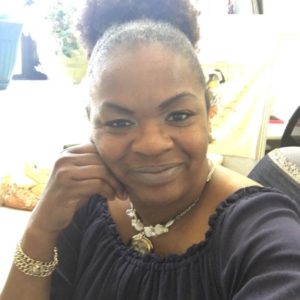 Tikvah Wadley, AAS, CCE, CD(DONA), BDT (DONA), is a certified doula and birth doula trainer through DONA International, and has worked in the Chicago community for nearly 20 years and believes in empowering women in today’s society. Her didactic and experiential training approach welcomes creativity and learning for every participant. An activist for women’s health, she has served as a lactation counselor since 2003 and a certified childbirth educator since 2002.
Tikvah Wadley, AAS, CCE, CD(DONA), BDT (DONA), is a certified doula and birth doula trainer through DONA International, and has worked in the Chicago community for nearly 20 years and believes in empowering women in today’s society. Her didactic and experiential training approach welcomes creativity and learning for every participant. An activist for women’s health, she has served as a lactation counselor since 2003 and a certified childbirth educator since 2002.
In 2012, Tikvah trained young women to become community-based doulas for youth in Chicago’s foster care system through HealthConnect One’s partnership with UCAN. She continues working with this program, and with other community-based, peer-to-peer support programs around the country, today.
Tikvah is a warm and caring, experienced and often humorous public speaker, and is adept at resolving conflicts. Before joining the HC One staff, she was instrumental in recruiting more than 500 women for the University of Chicago Doula Project, taught a variety of classes for the YMCA. and co-trained breastfeeding peer counselors and community health workers in collaboration with existing HC One staff. With each training, she looks forward to meeting every participant and engaging the learning experience between mom and baby.
In her free time, Tikvah likes to go treasure hunting — meaning, she looks for people to share encouraging words with, often strangers, for something they may be going through.
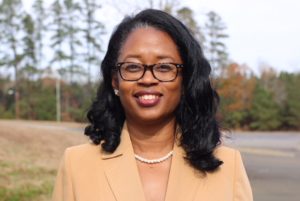 Tonya Daniel: CD(DONA), BDT(DONA), LCCE, FACCE, IBCLC is a graduate of the University of North Carolina at Chapel Hill where she studied Sociology, concentrating in the health of women and children. Having a diverse career background, from teaching middle and high school English, to working the past 10+ years in the field of public health, Tonya has pulled from those various experiences to influence the lives of people she encounters. Tonya serves on the DONA International board of directors as Eastern Membership Director, is a DONA certified birth doula, birth doula trainer, Lamaze Certified Childbirth Educator, Lamaze program trainer with the Duke AHEC Lamaze Educator Program, International Board Certified Lactation Consultant and Fellow of the American College of Childbirth Educators. She began working with expectant and parenting families in 2000 and is passionate about providing labor support, childbirth education and lactation services to women in her North Carolina community, especially those in areas of limited resources or access. She has had the honor of joining other birth workers to train healthcare staff and community workers in the United States, Kenya, and Kuwait with the hopes of improving pregnancies, births, and maternal/child health globally. She continues to partner with like-minded individuals and local health departments, hospitals, and private institutions to increase the number of doulas and breastfeeding advocates in areas at risk for high maternal and infant mortality. Above all, she is proud to say her most valued achievement is being the wife of 23 years to her husband, her biggest cheerleader, and mom to four amazing kids ages 19, 16, 13, and 9…and a four-legged pit, Bella.
Tonya Daniel: CD(DONA), BDT(DONA), LCCE, FACCE, IBCLC is a graduate of the University of North Carolina at Chapel Hill where she studied Sociology, concentrating in the health of women and children. Having a diverse career background, from teaching middle and high school English, to working the past 10+ years in the field of public health, Tonya has pulled from those various experiences to influence the lives of people she encounters. Tonya serves on the DONA International board of directors as Eastern Membership Director, is a DONA certified birth doula, birth doula trainer, Lamaze Certified Childbirth Educator, Lamaze program trainer with the Duke AHEC Lamaze Educator Program, International Board Certified Lactation Consultant and Fellow of the American College of Childbirth Educators. She began working with expectant and parenting families in 2000 and is passionate about providing labor support, childbirth education and lactation services to women in her North Carolina community, especially those in areas of limited resources or access. She has had the honor of joining other birth workers to train healthcare staff and community workers in the United States, Kenya, and Kuwait with the hopes of improving pregnancies, births, and maternal/child health globally. She continues to partner with like-minded individuals and local health departments, hospitals, and private institutions to increase the number of doulas and breastfeeding advocates in areas at risk for high maternal and infant mortality. Above all, she is proud to say her most valued achievement is being the wife of 23 years to her husband, her biggest cheerleader, and mom to four amazing kids ages 19, 16, 13, and 9…and a four-legged pit, Bella.
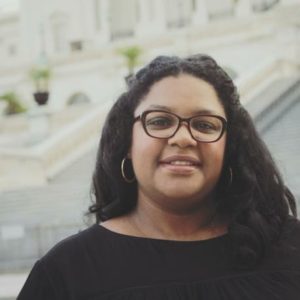 Ravae S.M. Sinclair, JD, CD(DONA), LCCE, CLE is a certified birth doula, Lamaze certified childbirth educator, lactation counselor and postpartum doula in the Maryland, Virginia and Washington D.C. areas. Since she began her career in 2002, Ravae has supported nearly 500 families through a wide variety of birth experiences. As a business owner, Ravae intentionally serves multicultural and international families.
Ravae S.M. Sinclair, JD, CD(DONA), LCCE, CLE is a certified birth doula, Lamaze certified childbirth educator, lactation counselor and postpartum doula in the Maryland, Virginia and Washington D.C. areas. Since she began her career in 2002, Ravae has supported nearly 500 families through a wide variety of birth experiences. As a business owner, Ravae intentionally serves multicultural and international families.
Ravae has worked as a doula in a variety of settings, including on the staff at Columbia Center Birth Place and Sibley Hospital. Currently, she serves on the board of directors for DONA International as President-Elect, is a standing committee member on the Advocacy, Publications and Conference committees and has worked on ad hoc committees to address policy and bylaws changes when needed.
The interviews
Sharon Muza: What drew you to doula work in the first place?
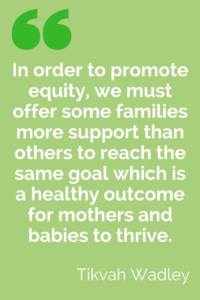 Tikvah Wadley: I was a teen mother who gave birth alone and I knew what that felt like, I didn’t like it, and I didn’t want anyone to experience giving birth alone. I was working at the University of Chicago and they were about to conduct a study on doulas and wanted to know if it made a difference to have a doula at births of primarily teenage mothers.
Tikvah Wadley: I was a teen mother who gave birth alone and I knew what that felt like, I didn’t like it, and I didn’t want anyone to experience giving birth alone. I was working at the University of Chicago and they were about to conduct a study on doulas and wanted to know if it made a difference to have a doula at births of primarily teenage mothers.
Tonya Daniel: I came into doula work by “divine intervention,” I guess you could say. I come from a community where resources for birth education and support are extremely limited… almost non-existent. I’m not even sure how the interest to be more present with my own birth came to be, considering there were very few family members or friends who believed in the body’s ability to birth without intervention. I knew I wanted something different and searched for it like my life depended on it (only to find out later that it actually did!). Once I had successful births, I went back to share my experience with the people in my community. Many asked if I would go with them when they gave birth and naturally, I did. I didn’t know what I was doing at the time was doula work.
Ravae S.M. Sinclair: I became a birth doula because it complimented my pregnancy and infant massage practice.
SM: Do you have a target market – a segment of the population that holds a soft spot in your heart – i.e., teens, people of color, VBACs? LGBTQIA+ clients?
TW: All women hold a spot in my heart, especially teenagers. I just don’t believe anyone should give birth alone whether they can afford a doula or not.
TD: I have several soft spots, but there’s a nice, plush spot in my heart specifically for Black families, especially those first generation, low interventionists – those desiring to give birth with little to no intervention and are the first in their family lines to aspire to do so. I’m also big on birth education and empowering families and their support circles. I don’t specifically market my services just for that group, but I do concentrate my energies on families that may be marginalized to make those births achievable.
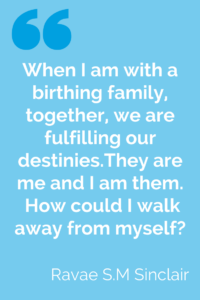 RS: Yes, one of the compelling reasons I left legal practice was to support families of color and LGBTQIA+ families to help them thrive and survive in the childbearing year. It is an absolute joy to watch them move through early parenthood informed, healthy and empowered.
RS: Yes, one of the compelling reasons I left legal practice was to support families of color and LGBTQIA+ families to help them thrive and survive in the childbearing year. It is an absolute joy to watch them move through early parenthood informed, healthy and empowered.
SM: Maternal morbidity and mortality are significantly higher for Black people birthing in the USA. How do you balance supporting your Black clients with the reality of birthing while Black without creating an additional layer of stress and tension on top of the normal feelings and emotions of labor and birth that affect any birthing person?
TW: I can admit whenever I am attending a birth I have a talk with myself because births may not always happen the way I envisioned it. I am a doula for Black families the majority of the time with very little experience with supporting other races prenatally and at births. I have candid conversations about maternal mortality and infant mortality affecting Black families more than any other race. I discuss myths and the importance of partnering with your baby to breastfeed and how that can help decrease the chance of infant mortality. It reminds me of how it’s a big deal when our babies make it to their first birthday and we celebrate this milestone big in the African American culture.
TD: To some extent, I don’t think there is a big differentiation between what I do to address the balance of support without increasing stress. To me, it’s about equity, not just equality. There is a difference between the two. I do a lot more education with the normal process of birth and making sure families and their support circles are aware of options. I spend a lot of time educating and demonstrating how and when to advocate for themselves. My goal from the start is to increase their confidence in their ability to birth, help families to understand that they have a voice whether it’s deciding where to get prenatal care, how to decide the best place to go (and what to do if resources or access to resources are limited); how and where to give birth, etc. I strategically include their support circle in those conversations as well. Those people are SO vital to the success of a birth. Since I rarely support people in the pregnancy planning stage, I also get them to think about things that may influence outcomes for their next pregnancy…where they live, health habits, education, financial support, etc.. those social determinants of health. Preparation is never lost time!
RS: I don’t balance it. The reality of the threat that birthing while Black in America poses to their lives is so obvious to them that balance is not even possible. In lieu of reality, I set my intention to be a cushion and a resource that links them to information and more resources in our community during their pregnancy, birth and postpartum period.
SM: How do you not walk away? What keeps you in the game when your heart is broken and your soul is damaged from holding witness to the experiences of Black birthing people?
TW: I can’t walk away and leave my family on the table! Neither do I have the right to walk away, lick my wounds, sit in the corner, and cry. I can cry but not quit because that’s when the families and I lose! I believe as long as I show up, put on my “uniform”, and come out to the birthing field, I still can make a difference. It’s when I don’t put on my “uniform” and refuse to show up I have lost an opportunity to make a difference.
TD: I personally can’t afford to walk away. I will always be who I am… a Black mother. That won’t change. My culture and my experiences, personal and otherwise, will always be a part of who I am. It’s ingrained. Walking away would be denying that those factors even exist. Walking away would mean that I am giving permission for the inequities to perpetuate… even more so, walking away would mean that I am not doing my part to engender change for my offspring and those I’ve worked to empower. So yes, for me, it’s personal. I have four kids, three daughters, and one son. It breaks my heart that as it stands when they decide to have kids, they can’t just have a baby and know that they will be presented with the same opportunities and options as others for the best birth possible. Some information may be withheld from them just because someone else thinks it’s not needed or they won’t make changes because “historically, that’s what those people do.” They may still have the stresses and power struggles to deal with if they aren’t empowered to have a voice for their space and if systems remain the same… and because I don’t know who they will choose to have kids with, I have to press forward for those people, too. We can’t tear down a wall all at once, but small chips make big holes!
RS: Hmmm, on the contrary, I feel like our hearts are strong, not broken. With each family I support, I feel our souls are strengthened. When I am with a birthing family, together, we are fulfilling our destinies. They are me and I am them. How could I walk away from myself?
SM: What can doulas do to support families of color prenatally, during the birth and postpartum period? What can doulas do in the moment when mistreatment is happening?
TW: We can continuously support families by offering a holistic approach whether they can afford a doula or not. In order to promote equity, we must offer some families more support than others to reach the same goal which is a healthy outcome for mothers and babies to thrive. What can doulas do in the moment when mistreatment is happening? Acknowledge it and let the birthing family know they can report it. I would also report it after I have left mother and family. I believe in my heart “if you don’t speak up about inequality or injustice by default you’re agreeing as a silent partner.” It costs something to speak up and the cost is courage! The risk of standing by yourself speaking out against inequality can be a lonely place which can be difficult for some.
TD: We need more doulas to become more involved in system structures. If you don’t know the structures, become familiar with them. The inequities are not just a “birth” issue, but a public health issue infiltrating various components of life. Doulas need to be involved with employment, social services, housing committees, educational systems. We can bring more to the table than just how to give birth or take care of the baby. We are “gifted” individuals… we become a part of that family, all parts of that family. It is truly an untapped resource.
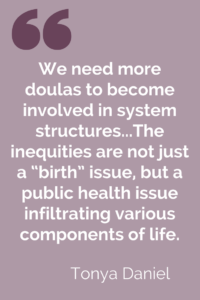 SM: White people, through systemic racism and practice, have created the outcomes that we are seeing today. White people have a responsibility to repair the damage they have caused. In addition to making trainings accessible and affordable to doulas of color, encouraging more Black trainers of color and financially supporting organizations dedicated to serving families of color, (such as Open Arms Perinatal Services, HealthConnect One and Ancient Song Doula Services and many others), what is something that every person can do to turn this ship around?
SM: White people, through systemic racism and practice, have created the outcomes that we are seeing today. White people have a responsibility to repair the damage they have caused. In addition to making trainings accessible and affordable to doulas of color, encouraging more Black trainers of color and financially supporting organizations dedicated to serving families of color, (such as Open Arms Perinatal Services, HealthConnect One and Ancient Song Doula Services and many others), what is something that every person can do to turn this ship around?
TW: Continue to acknowledge the monster and work collaboratively to destroy it. We also need to hold each other accountable and operate in transparency during these difficult discussions. We must work together to destroy the very scent of inequity and injustices present prenatally, during birth, and postpartum. I also agree with financially supporting organizations dedicated to serving people of color and encouraging more Black trainers to join.
TD: Continue to bring the issue to the forefront until things change and systems change. That will take lots of hard and sometimes depressing work. However, I don’t think we’ll get far with continuing to play the blame game. Make acknowledgments of where the systems need improvements and work to make the change, collectively. Viruses don’t corrupt systems from the outside. Sometimes we have to become a part of the system (even at various levels) in order to change it. It doesn’t mean to necessarily adopt system practices, but become a part of it and remember your goal to better the lives of all people. Fortify areas that need a little more than others… that’s the equity vs. equality piece. That’s why I started working in public health. I’ve been working in the field of public health for at least 15 years and have gradually seen change and feel in some areas, have even been a part of starting that change. It’s going to take consistency and persistence; keep knocking on the same door. Eventually, it will open or you’ll at least wear the wood down!
RS: Just ONE thing? Listen to Black women!


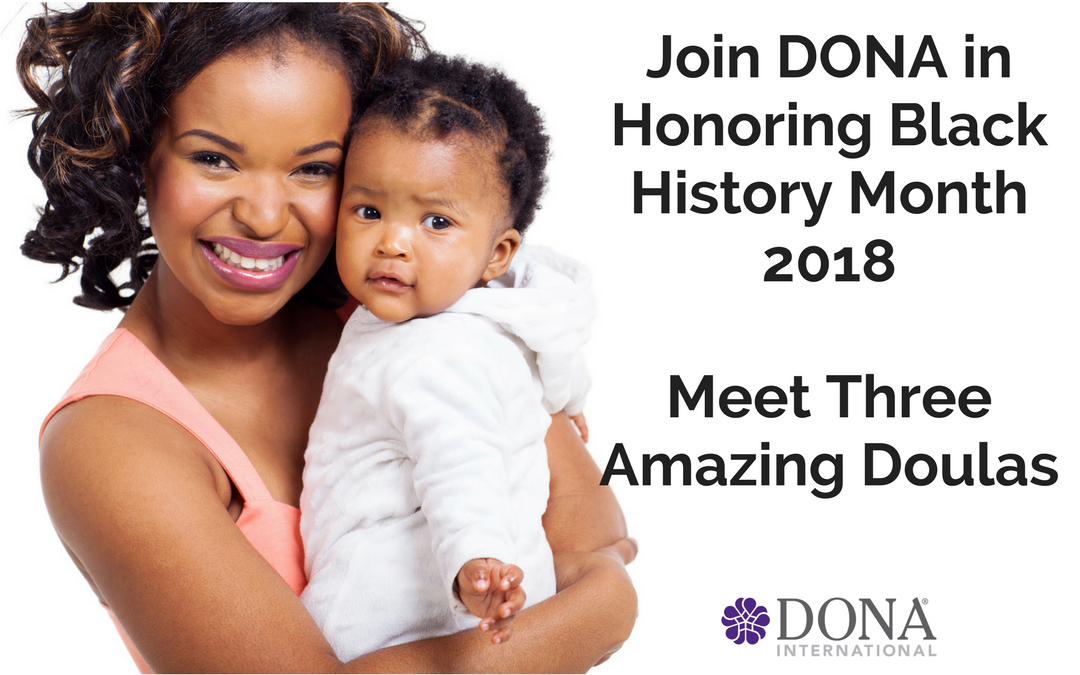
this article was simply beautiful. Thanks for writing and sharing. All the inspirations needed for an aspiring doula of color.
Sharon,
Thank you for sharing this empowering and candid report on three amazing Doulas. It is so important, that our health team reflect the people they serve. It is motivating to see someone who looks like you. Bravo to the women for being trailblazers!
Thank you for giving the space for mostly White doulas to hear the words and stories of these DONA doulas and leaders in their communities. We do need to lead the way as an organization to helping members understand equity, what it means and why its important. I like what Ravae Sinclair said, Listen to Black Women! I would add, BELIEVE THEM. If that’s the way they experienced something, let that be enough. We believe other women when they tell us how they experienced their births. If doulas have any power to end injustice it is by listening, sitting with pain without trying to fix it, and believing the person’s story. That goes a long way in this world today – listening is one of the doula’s superpowers.
This post was absolutely what I needed to read today, It reinforced my mission to become a DONA Doula and do what I can to be there for mother’s and their babies, plus spread the word in my community and beyond. I take my Birth Doula training in March 2018, I’m a little nervous nevertheless I am passionate to help.
This is Great!!! that Dona International is opening a new chapter in awareness about all the communities that doula’s service.